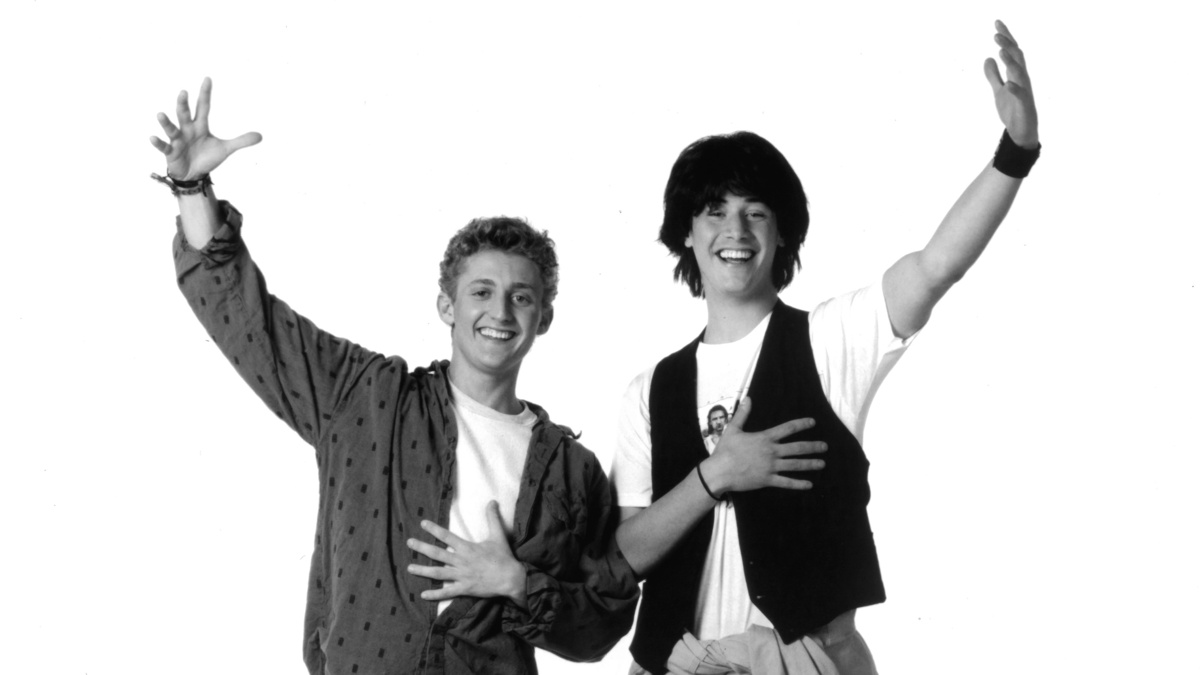Buzz

Nothing to Be Done, Dudes! Four Reasons Why the Bill & Ted Waiting for Godot Will Be a Most Excellent Time
There are casting announcements, and then there are casting announcements. When the news broke that Keanu Reeves and Alex Winter—the duo best known as Bill and Ted—would play Vladimir and Estragon in Waiting for Godot on Broadway, you could hear the collective gasp of the theater community, shock mingling with disbelief and wonder:
Whoa.
Reeves and Winter’s Waiting for Godot is set to premiere in fall 2025. Here’s why we’re expecting a most excellent time in the theater.
“Sad Keanu” on Broadway
Ubiquitous meme aside, there is something powerfully sad about Keanu Reeves. He has led some of the biggest films of all time—films in which he is frequently called upon to open can after can of whoopass on his foes—while looking like he’d rather be anywhere else. That energy turns out to be incredibly magnetic on a movie screen, as strangely transfixing as Vantablack, and feels perfectly suitable for the existential preoccupations of Godot.
By the way, if Reeves comes off as coolly detached, it’s a quality that is notably at odds with his willingness to go out on a limb as an actor. He turned down Speed 2 to play Hamlet on stage in Winnipeg, and gamely tackled Shakespeare in Kenneth Branagh’s Much Ado About Nothing and Gus Van Sant’s Henry IV riff My Own Private Idaho. You have to admire the ballsiness of opting to make his Broadway debut with Beckett. What’s more, this whole thing was his idea.
Bill & Ted’s Existential Adventure
Let’s be real. We’re all thinking it. This Waiting for Godot will be, in every sense that matters, the fourth installment in the epic saga of Bill S. Preston, Esq. and Ted “Theodore” Logan.
That’s not as crazy as it sounds. As anyone who has seen Bill & Ted’s Bogus Journey will attest—its working title was Bill & Ted Go to Hell—the franchise has gone to some pretty out-there and incredibly dark places. (“How’s it hanging, Death?”) Given that precedent, the idea of these ebullient goofballs suddenly finding themselves on that desolate stretch of country road where time and space are broken—as if their phone booth took a wild detour on its journey through the Circuits of Time—isn’t all that far-fetched.
And, as it turns out, Beckett’s fragmented dialogue, with its lugubrious vaudeville rhythms and gloomy punchlines, is eerily easy to imagine in the slacker tones of those San Dimas teens:
VLADIMIR: I don’t understand.
ESTRAGON: Use your intelligence, can’t you?
VLADIMIR uses his intelligence.
VLADIMIR: (finally) I remain in the dark.
The more you think about it, the more obvious it becomes: The casting isn’t a mere marketing ploy or prank—in a cunning masterstroke of unpretentiousness, Reeves and Winter are actively leaning into the lowbrow appeal of Bill and Ted. (“[T]heir shared sense of humor in those movies and in real life is going to be very beneficial to the production,” director Jamie Lloyd told the New York Times.) At the end of the day, Bill and Ted are not that dissimilar to Didi and Gogo: a couple of dudes, maybe not the brightest bulbs in the box, just doing their best in a confusingly heinous situation.
The last time Waiting for Godot was on Broadway, it was a vehicle for Ian McKellen and Patrick Stewart and carried the antique whiff of the RSC. You couldn’t get farther from those RP-speaking thespian luminaries than Reeves and Winter. Even if the vibe isn’t precisely “Party on, dudes,” ticket buyers will be primed for giggles, not braced for an intellectual workout.

(Photo: Joan Marcus)
That a portion of that audience will be inclined to think of the characters on stage as the ragged relations of Bill and Ted—characters they already know and love—well, that’s a neat way of eliciting affection for Beckett’s tatterdemalion stoics, and rendering one of the most befuddling pieces of 20th-century dramatic literature instantly more accessible.
A Boundary-Pushing Director
Notoriously, the estate of Samuel Beckett isn’t big on productions taking liberties with the playwright’s work. Those hats that Vladimir and Estragon wear? Better make sure they’re bowler hats. Feel like adding incidental music, disregarding stage directions or casting women? Nothing to be done, dudes.
Soon bringing his reinvented Sunset Boulevard to Broadway, Jamie Lloyd is the theatermaker least likely to abide by the rules, whose sparse, monochrome, netherworld aesthetic also seems just right for Beckett. Lloyd doesn’t so much as blow the cobwebs off the classics as demolish and rebuild from scratch. And as we see from him having a former Pussycat Doll play Norma Desmond, the boldness begins at the casting stage.
Will the Wyld Stallyns trade sweet air guitar licks as Didi and Gogo? Probably not. But if any working director was going to test the limits and bring something fresh to the material—and possibly even get the Beckett estate to sign off on some new bold ideas—it would be Lloyd.

Vladimir and Estragon: BFFs
A lot of the appeal of the Bill and Ted movies is Reeves and Winter’s easygoing chemistry—the result of a genuine offscreen friendship. (They bonded easily, Winter has said, since they both played bass and rode motorcycles.)
Casting actors who have a history together tends to bring out the humanity in Beckett’s play—that was true of the production led by McKellen and Stewart but also, most recently, Michael Shannon and Paul Sparks. Godot is, on one level, about the occasionally strained but frequently touching bond between two lost souls helplessly stuck with one another.
Given Reeves and Winter’s decades-long friendship, we’re anticipating a Didi and Gogo with a real warmth and depth of feeling. And if the ultimate show is half as inspired, unexpected and whoa-inducing as the initial announcement, Waiting for Godot will be a most excellent theatrical adventure. Like the downtrodded dudes at its center, we can hardly wait.
